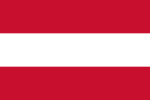Corruption in Austria
| Political corruption |
|---|
 |
| Forms and concepts |
| Anti-corruption |
| Corruption by continent and country |
Austria has a well-developed institutional and legal system, and most corruption cases under investigation by a parliamentary committee end with judicial trials and effective judgments. However, there are several significant Austrian corruption cases which have taken place during the past decade involving land and regional officials, high-level public officials, the central government and, in one instance, the former Chancellor.[1]
In most cases, corrupt practices were related to conflicts of interest, abuse of office, money laundering and influence peddling. The corruption scandals have put into doubt the ethical standards of the political elite.[1] This doubt is reflected in the findings of Eurobarometer 2012, where two-thirds of respondents perceive national politicians to be corrupt and also the most corrupt institution in Austria.[2]
According to 2016 results of Corruption Perception Index of Transparency International, Austria ranks 17th place out of 176 countries.[3]
Extent
According to several sources, corruption is not considered a problem for doing business in Austria. According to Investment Climate Report 2013 by the US Department of State 2013, corruption is not considered as a serious problem impeding business in Austria. The World Economic Forum’s Global Competitiveness Report 2013-2014 notes that it is uncommon for companies to make irregular payments or bribes connected with imports and exports, public utilities, annual tax payments, and awarding of public contracts and licenses. Moreover, corruption is ranked as the twelfth most problematic factor for doing business in Austria.[1]
According to the Global Competitiveness Report 2013-2014, favouritism among government officials towards well-connected companies and individuals is a competitive disadvantage for the country. According to Identifying and Reducing Corruption in Public Procurement in the EU 2013, officials involved in public procurement lack effective corruption screening.[1]
See also
References
- ^ a b c d "Austria Corruption Profile-Political Climate". Business Anti-Corruption Portal. Retrieved 17 December 2013.
- ^ "Eurobarometer 2012- Austria" (PDF). The European Commission. Retrieved 17 December 2013.
- ^ e.V., Transparency International. "Corruption Perceptions Index 2016". www.transparency.org. Retrieved 2017-03-24.
External links

